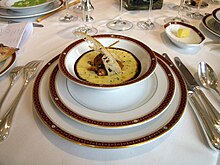
Back Franse kookkuns Afrikaans مطبخ فرنسي Arabic Fransa mətbəxi Azerbaijani Французская кухня Byelorussian Френска кухня Bulgarian Gastronomia de França Catalan Francouzská kuchyně Czech Det franske køkken Danish Französische Küche German Γαλλική κουζίνα Greek
This article needs additional citations for verification. (February 2023) |
| Part of a series on the |
| Culture of France |
|---|
| People |
| Mythology and folklore |
| Cuisine |
| Festivals |
| Religion |
| Music and performing arts |
| Sport |



French cuisine is the cooking traditions and practices from France. In the 14th century, Guillaume Tirel, a court chef known as "Taillevent", wrote Le Viandier, one of the earliest recipe collections of medieval France. In the 17th century, chefs François Pierre La Varenne and Marie-Antoine Carême spearheaded movements that shifted French cooking away from its foreign influences and developed France's own indigenous style.
Cheese and wine are a major part of the cuisine. They play different roles regionally and nationally, with many variations and appellation d'origine contrôlée (AOC) (regulated appellation) laws.[1]
Culinary tourism and the Guide Michelin helped to acquaint commoners with the cuisine bourgeoise of the urban elites and the peasant cuisine of the French countryside starting in the 20th century. Many dishes that were once regional have proliferated in variations across the country.
Knowledge of French cooking has contributed significantly to Western cuisines. Its criteria are used widely in Western cookery school boards and culinary education. In November 2010, French gastronomy was added by the UNESCO to its lists of the world's "intangible cultural heritage".[2][3]
- ^ Miller, Norman (October 2014). "The ABCs of AOC: France's Most Prized Produce". FrenchEntree Magazine. Archived from the original on 14 May 2021. Retrieved 13 May 2021.
- ^ "Bon appétit: Your meal is certified by the UN". Archived 20 November 2010 at the Wayback Machine Dallas Morning News.
- ^ UNESCO (16 November 2010). "Celebrations, healing techniques, crafts and culinary arts added to the Representative List of the Intangible Cultural Heritage". UNESCO. Archived from the original on 27 January 2011. Retrieved 4 June 2012.